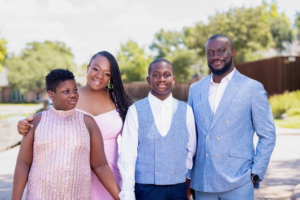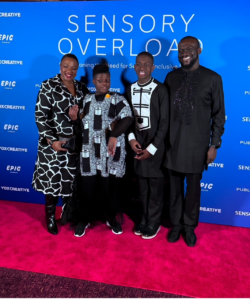By Nicole Ward, Data Journalist
This article is part of the Dallas Regional Chamber’s (DRC) award-winning Disability Inclusion Toolkit. The toolkit, presented by Ernst & Young LLP, helps companies assess and maximize their inclusion of people with disabilities, including neurodivergence. The toolkit’s data, resources, and best practices are informed by the perspective of experts and people living and working with disabilities.

An often overlooked part of disability inclusion is the role of caretakers. According to U.S. News & World Report, in the United States, more than one in four people over the age of 50 are caregivers to friends or family members, and 23% of this population is looking after someone with an intellectual or developmental disability.
Lola Dada-Olley has been in this role since she was a child—first to her younger brother and now her two children, all of whom are on the autism spectrum.
In addition to this, Dada-Olley is an Assistant General Counsel and Vice President for J.P. Morgan Chase & Co., serving as firmwide counsel for external-facing matters tied to the Americans with Disabilities Act, and before that, she worked in the public sector in both Illinois, at the Attorney General’s office and Workers’ Compensation Commission, as well as in Plano, as an Assistant City Attorney, but you may recognize her name from the “Not Your Mama’s Autism (NYMA) Podcast,” where she talks about the autism journey her family walks.
“Autism is multi-faceted, so it doesn’t always manifest in one way,” said Dada-Olley. “I wanted to create a space for the conversation and for different perspectives because many times families who are impacted by autism, or another form of neurodivergence, can feel isolated.”
Her family was first introduced to autism in Chicago in the late 1980s, when her younger brother was given what, at that time, was a little-known diagnosis.
“There was no awareness, much less acceptance and inclusion campaigns,” she says.
She recalls he had been communicating verbally until one day, he just stopped.
“We never heard him speak another word again.”
He also stopped developing cognitively, staying at the intellectual level of about a three-year-old; he’s now in his thirties. He still lives in their family home with his parents outside of Chicago.
Little did she know that exposure to neurodiversity while growing up was preparation for her role as a mother to two children also on the spectrum.
“I couldn’t have possibly known, but growing up with my brother would be part of a blueprint that was essential in raising my children today. I do not believe in coincidences. God was preparing me for a lifetime of caregiving and advocacy through the lens of a sibling, mother, and attorney.”
Dada-Olley’s role as a caretaker puts her within a much larger nationwide community. However, her role as advocate is motivated by her own experience, which she hoped to share so that other caretakers might feel more supported and learn from her.

A different kind of podcast offers a different kind of support
In her podcast, which she spoke about at her 2021 TEDx Talk, Dada-Olley shares her family’s experience with autism through a multigenerational and multicultural lens. It began in the 1980s with her brother’s diagnosis and continues with her two children who are both on the spectrum. NYMA Podcast explores the challenges and triumphs an autism diagnosis can bring.
She also explores closely-related topics that are important to caretakers such as self-love, treatments, marriage therapy, and redefining success. She speaks as someone who has both had an impressive legal career, as someone whose life has been shaped by multi-generational autism, and with the authenticity of someone who has been through it.
In Dada-Olley’s podcast, businesses have an opportunity to offer a different kind of support, as it can be a person’s place of employment that they first turn when confronted with a challenge. Creating a culture where employees feel confident finding the resources they need – like help navigating social security or products and services for themselves or a family member – reinforces trust and loyalty.
Putting pen to paper
In addition to her podcast, Dada-Olley is also editing her book manuscript, which is scheduled to be published in 2026. Her memoir will highlight the importance of community when navigating unfamiliar terrain.
“With an autism diagnosis, there are going to be many times when you need to turn to people for support. And, of course, some friends and family will be there, but you need people who have experienced the fear and frustration, but also the joy.”
Her upcoming book will also have practical information like questions caregivers can ask health care providers and educators when navigating complex medical needs and special education, and it will include a section on questions to ask yourself before taking your own advocacy journey public.

Sensory Overload
Because understanding something can be hard without experiencing it, Dada-Olley and her family were invited to be part of a documentary that highlights what it’s like to be sensory sensitive—common with people who have autism. She would later learn that her family, chosen along with two other families, were considered among nearly two hundred subjects for the film.
Given the very sensitive nature of having a film crew documenting her family, there was some hesitation at first in providing the filmmakers with such access. However, after speaking with some of the filmmakers in-depth and hearing the level of research and intention that would go into this film, including featuring health care experts in the documentary, Dada-Olley and her husband decided to move forward.
Once she saw the final cut of the film, she turned to the director and their eyes met. Amid the applause, she simply mouthed the words, “thank you.”
Called Sensory Overload, the film follows a group of people who both live with sensory sensitivity and those who support them. The documentary was produced as part of the Sensodyne Sensory Inclusion Initiative to promote awareness of the importance of more sensory-inclusive oral care and can be streamed on Hulu.
Visit Dada-Olley’s website to connect and learn more.
To access the Dallas Regional Chamber’s Disability Inclusion Toolkit, visit our website.